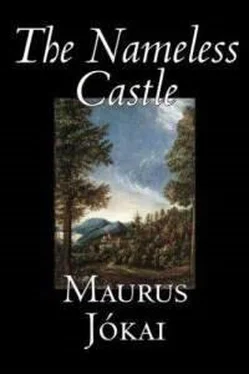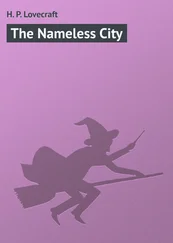Maurus Jokai - The Nameless Castle
Здесь есть возможность читать онлайн «Maurus Jokai - The Nameless Castle» весь текст электронной книги совершенно бесплатно (целиком полную версию без сокращений). В некоторых случаях можно слушать аудио, скачать через торрент в формате fb2 и присутствует краткое содержание. Город: New York, Год выпуска: 1898, Издательство: Doubleday, Page & Company, Жанр: Историческая проза, на английском языке. Описание произведения, (предисловие) а так же отзывы посетителей доступны на портале библиотеки ЛибКат.
- Название:The Nameless Castle
- Автор:
- Издательство:Doubleday, Page & Company
- Жанр:
- Год:1898
- Город:New York
- ISBN:нет данных
- Рейтинг книги:4 / 5. Голосов: 1
-
Избранное:Добавить в избранное
- Отзывы:
-
Ваша оценка:
- 80
- 1
- 2
- 3
- 4
- 5
The Nameless Castle: краткое содержание, описание и аннотация
Предлагаем к чтению аннотацию, описание, краткое содержание или предисловие (зависит от того, что написал сам автор книги «The Nameless Castle»). Если вы не нашли необходимую информацию о книге — напишите в комментариях, мы постараемся отыскать её.
The Nameless Castle — читать онлайн бесплатно полную книгу (весь текст) целиком
Ниже представлен текст книги, разбитый по страницам. Система сохранения места последней прочитанной страницы, позволяет с удобством читать онлайн бесплатно книгу «The Nameless Castle», без необходимости каждый раз заново искать на чём Вы остановились. Поставьте закладку, и сможете в любой момент перейти на страницу, на которой закончили чтение.
Интервал:
Закладка:
“Accept my greeting, marquis!” responded Vavel, He raised his pistol, and fired without taking aim. De Fervlans fell backward to the ground.
CHAPTER IV
When De Fervlans’s men saw that their leader had fallen they retreated toward the bridge, where a portion of the troop alighted and held at bay their pursuers, while the rest tore up and flung into the stream the planks of the bridge. Then the men who had prevented the Volons from following crossed on foot the narrow lengthwise beam to the opposite shore—a feat impossible for a man on horseback.
The spot where the fiercest fighting had occurred was already cleared when Katharina arrived upon it. She shuddered with horror, and staggered like one who walks in his sleep as she moved about the desert place.
Suddenly she came upon a large wild-rose bush covered with bloom. Close by it lay a horse with the hilt of a sword protruding from his breast. Near the dead animal lay a metal helmet ornamented with the gilded imperial eagle, and a little farther on lay a mud-stained form in a uniform of coarse gray cloth, with a gaping wound in his head; his left hand clutched the rushes among which he had fallen. As Katharina, in her peasant gown, moved timidly across the open space, she heard a voice say faintly in Hungarian:
“For God’s sake, good woman, give me a drink of water.”
Without stopping to question whether he was friend or foe, Katharina caught up the metal helmet to fetch the water.
There was water everywhere about her, but it was the filthy water of the morass.
Katharina remembered having heard that the shepherds of the Hansag, when they were thirsty, cut a reed and thrust it deep into the swampy earth, when clear, drinkable water would rise from the lower soil. She therefore thrust a long cane into the moist earth, then put her lips to it, and sucked up the water. On removing her lips a clear stream shot upward from the cane. She held the helmet under this improvised fountain until it was full, then returned with it to the rose-bush.
The wounded man was lying on his back, his bloodstained face upturned toward the sky. Katharina knelt by his side, and held the helmet to his lips.
“Themire!” gasped the wounded man.
At sound of the name a sudden fury seemed to seize the woman.
“De Fervlans!” she cried, in a hoarse voice. “ You! you, the accursed destroyer of my daughter! May God refuse to forgive you for making of me the wretched creature I am!”
As she spoke she raised the helmet, of water above her head, as if she would dash it upon the dying man’s face; but he turned his head away from her furious gaze, and did not stir again.
Slowly Katharina lowered the helmet, and struggled with her excited feelings. She looked about her, and saw another motionless form lying across a clump of turf. Perhaps he was still alive. Perhaps she might help him.
She stepped quickly to his side with the helmet of water and washed the blood and mud-stains from his face. Ah, what a hideous face it was! All the same, she carefully washed it, then bathed the gaping wounds in his head. They were horribly deep, and she was almost overcome by the fearful sight. But she looked upward for a moment, and it seemed to her as if she recognized amid the fleecy clouds a snow-white form, and heard an encouraging voice say:
“That is right, mother. I, too, performed such work.”
Then she took her handkerchief and bound it around the wounded man’s head. While so doing her eyes fell on the steel ring on his thumb.
“Satan Laczi!” she exclaimed.
She put her arms around him, and lifted him to a more comfortable position, wondering the while how he came to be there. Had he failed to find Marie, whom he was to accompany to Raab? Had Cambray, perhaps, prevented her from leaving the castle?
She bent over the wounded man and said:
“Satan Laczi, awake! Look up—come back to life!”
And Satan Laczi was such an obedient fellow, he opened his eyes and saw the lady kneeling by his side.
Then he opened his lips, and said in a very weak voice:
“I should like a drink of water.”
Katharina made haste to fill the helmet again at her fountain.
“Thank you, sister.”
“Look at me, Laczi bácsi;” commanded Katharina, in a cheerful tone. “Don’t you know me? I am the woman who gave shelter to your wife and child. I am little Laczko’s foster-mother.”
The wounded man smiled faintly, and murmured: “Yes, yes—Laczko—Laczko is a fine lad! He came near—shooting me because—because of the maid.”
“Tell me what you know about the maid,” eagerly questioned Katharina. “Where is she?”
The wounded man opened his eyes, and seemed to be trying to recall something. After a pause, he said slowly, and with evident difficulty:
“You need n’t—trouble about the—pretty maid. Laczko is a brave lad—and my wife—my wife is—an honest woman.”
“Yes, yes, I know,” returned Katharina. “A good lad, and an honest woman. But tell me, in heaven’s name, where is the maid?”
“The maid—Sophie Botta went with—my wife to Raab—they are there now—and Laczko too.”
How gently the lady bathed the wounded man’s face and hands! How carefully she renewed the bandages on the horrible wounds!
Ludwig Vavel, who hart approached noiselessly, stood and watched her perform the labor of love. He saw, heard, and admired. Then he came close to the kneeling woman, and clasped his arms around her.
“My Katharina! Oh, what a woman art thou!”
PART X
CONCLUSION
CHAPTER I
When Count Vavel returned from his skirmish with De Fervlans’s demons, he sent his betrothed at once to Raab, with instructions not to separate herself again from Marie.
He had not been able to accompany Katharina on her journey, as he had received marching orders immediately on his return to camp. On parting with his betrothed, however, he had promised to pay a visit to her and Marie at an early day, and to write to both of them daily.
The first part of his promise he had not been able to fulfil; his time was too fully occupied with the duties of the field. But he sent frequent messages to his loved ones; while every day, no matter where he might be, he would be sure to receive his letter from Raab—one sheet covered to the edges with Katharina’s writing, and the other with Marie’s.
Their letters were always cheerful, and filled with hope and confidence for the future. Ludwig fancied he could see the scene as Katharina described it, when Marie had opened the steel casket.
He knew just how delighted the young girl had been when she beheld nothing but ashes instead of the little garments, the documents, the portraits, the bank-notes; and he could hear her joyous laugh on finding herself relieved of the burden of her greatness. But what he could not hear was Katharina reciting his brave exploits during the fierce struggle on the Hansag, a recital Marie insisted on hearing every day.
Then the two, Marie and Katharina, would go every morning to church, to pray for Ludwig, to ask God to protect him, and bring him safely back to them. This was their daily pleasure and consolation.
Then came the bloody days of Karako, Papa, Raab, and Acs. The militia troops took active part in all these battles, and proved themselves valiant warriors.
Vavel with his Volons had been assigned to Mesko’s brigade, and had shared its adventurous march from Abda, around Lake Balaton to Veszprim. Here he found his spy and scout, Master Matyas, awaiting him.
For weeks he had not had a word from his loved ones. When he had sent them to Raab he believed he had selected a secure haven for them, but the course which events had taken proved that he had made a mistake in his calculations. Katharina and Marie were now surrounded on all sides by the enemy.
Читать дальшеИнтервал:
Закладка:
Похожие книги на «The Nameless Castle»
Представляем Вашему вниманию похожие книги на «The Nameless Castle» списком для выбора. Мы отобрали схожую по названию и смыслу литературу в надежде предоставить читателям больше вариантов отыскать новые, интересные, ещё непрочитанные произведения.
Обсуждение, отзывы о книге «The Nameless Castle» и просто собственные мнения читателей. Оставьте ваши комментарии, напишите, что Вы думаете о произведении, его смысле или главных героях. Укажите что конкретно понравилось, а что нет, и почему Вы так считаете.












